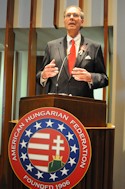 3/15/2014 - AHF commemorates Hungarian National Day and the 1848 War of Independence. The 1848 Hungarian Revolution and Freedom Fight sought to throw off the Austrian Yoke. It was quelled under the combined forces of Imperial Austria and Russia, but its impact is felt even today. 3/15/2014 - AHF commemorates Hungarian National Day and the 1848 War of Independence. The 1848 Hungarian Revolution and Freedom Fight sought to throw off the Austrian Yoke. It was quelled under the combined forces of Imperial Austria and Russia, but its impact is felt even today.
Each year, speakers focus on the significance of the 1848 revolution and how its ideals and goals relate to today's Hungary, including the need for unity, honest political debate, the political and human rights situation in Central and Eastern Europe and relations with the United States. This year's keynote address was delivered by Tamas Fellegi former Hungarian Minister of National Development and President of the Hungarian Initiatives Foundation. Other remarks given by Hungarian Ambassador Gyorgy Szapary. [read more]
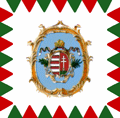 3/09/2013 - AHF commemorates Hungarian National Day and the 1848 War of Independence. The commemoration emphasized the relavance of Kossuth and the historic fight for democracy to today, Hungary's revered history of standing up for freedom and liberty against great odds, and the serious human and minority rights challenges facing ethnic-Hungarian communities throughout the Carpathian basin. 3/09/2013 - AHF commemorates Hungarian National Day and the 1848 War of Independence. The commemoration emphasized the relavance of Kossuth and the historic fight for democracy to today, Hungary's revered history of standing up for freedom and liberty against great odds, and the serious human and minority rights challenges facing ethnic-Hungarian communities throughout the Carpathian basin.
[read more] WITH VIDEO!
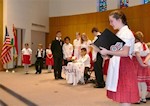 3/11/2012 - AHF commemorates Hungarian National Day and the 1848 War of Independence. The commemoration emphasized Hungary's revered history of standing up for freedom and liberty against great odds, including in 1848 – 1849, and urged that this history not defamed through political expediency. [read more] 3/11/2012 - AHF commemorates Hungarian National Day and the 1848 War of Independence. The commemoration emphasized Hungary's revered history of standing up for freedom and liberty against great odds, including in 1848 – 1849, and urged that this history not defamed through political expediency. [read more]
 3/15/2011 - The American Hungarian Federation of Metropolitan Washington, D.C., holds annual commemoration of the 1848 War of Liberation. Hungarian Ambassador George Szapary's Keynote Address was a welcome paradigm shift in Hungarian official policy toward Hungarians in the diaspora. AHF President Frank Koszorus reflected on what Kossuth's legacy means to us today: "Let us reach out and find all who want to participate [to] ensure democracy for all Hungarians and advance the foreign policy interests of our great American homeland. [read more] 3/15/2011 - The American Hungarian Federation of Metropolitan Washington, D.C., holds annual commemoration of the 1848 War of Liberation. Hungarian Ambassador George Szapary's Keynote Address was a welcome paradigm shift in Hungarian official policy toward Hungarians in the diaspora. AHF President Frank Koszorus reflected on what Kossuth's legacy means to us today: "Let us reach out and find all who want to participate [to] ensure democracy for all Hungarians and advance the foreign policy interests of our great American homeland. [read more]
 3/15/2010 - Hungarian Americans commemorate Hungarian National Day. President Obama sends congratulations. The 1848 Hungarian Revolution, under its leader Louis Kossuth, sought to throw off the Austrian Yoke. It failed after Russian intervention, but its impact on the United States is felt even today. This year's commemoration was organized by the American Hungarian Federation of Metropolitan Washington, DC, and held on March 14, 2:30 p.m., at the Kay Spiritual Center of the American University. [read more] 3/15/2010 - Hungarian Americans commemorate Hungarian National Day. President Obama sends congratulations. The 1848 Hungarian Revolution, under its leader Louis Kossuth, sought to throw off the Austrian Yoke. It failed after Russian intervention, but its impact on the United States is felt even today. This year's commemoration was organized by the American Hungarian Federation of Metropolitan Washington, DC, and held on March 14, 2:30 p.m., at the Kay Spiritual Center of the American University. [read more]
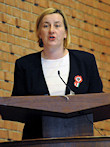 3/15/2009 - AHF of Washington, DC's Commemorates the 1848 Hungarian Revolution and War of Liberation. The Chapel at Wesley Theological Seminary at American University
in Washington, D.C., was once again the setting for AHFDC's annual commemoration of the 1848 Hungarian Revolution and War of Liberation in which Hungary sought to establish a democratic republic and split with Austria under its leader Louis Kossuth. This year, speakers focused on the significance of the 1848 revolution and how its ideals and goals relate to the political climate in today's Hungary. 3/15/2009 - AHF of Washington, DC's Commemorates the 1848 Hungarian Revolution and War of Liberation. The Chapel at Wesley Theological Seminary at American University
in Washington, D.C., was once again the setting for AHFDC's annual commemoration of the 1848 Hungarian Revolution and War of Liberation in which Hungary sought to establish a democratic republic and split with Austria under its leader Louis Kossuth. This year, speakers focused on the significance of the 1848 revolution and how its ideals and goals relate to the political climate in today's Hungary.
This years keynote speaker, the Rev. Judit Mayer, commented that today's politicians could learn from the heroes of 1848 who put the nation ahead of their own personal political agenda: "A politikai önzetlenség példáját jellemzi, hogy március 15-én a később "márciusi ifjaknak" nevezett fiatalok átengedték a vezetést a mérsékelt liberálisok vezéregyéniségeinek, akik ismertebbek és elfogadhatóbbak voltak a polgárok számára. Nem a saját politikai vágyaik kielégitése volt a mérvadó, hanem az, hogy mi jó a nemzetnek. A mai politikusok közül sokaknak talán róluk kellene példát venni." [read more]
 3/18/2007
- Washington-area Hungarians commemorate the 1848 Revolution... Hungarians in the Washington Metropolitan area gathered Sunday,
March 18, 2007 at the Wesley Theological Seminary, to commemorate March
15 and the 1848 Hungarian Revolution. The American Hungarian Federation
of Metropolitan 3/18/2007
- Washington-area Hungarians commemorate the 1848 Revolution... Hungarians in the Washington Metropolitan area gathered Sunday,
March 18, 2007 at the Wesley Theological Seminary, to commemorate March
15 and the 1848 Hungarian Revolution. The American Hungarian Federation
of Metropolitan 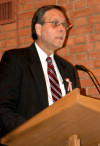 Washington, D.C., organized the event, andmembers of
the Bathori Jozsef Hungarian Scout Troup of Washington provided a good
part of the program. Washington, D.C., organized the event, andmembers of
the Bathori Jozsef Hungarian Scout Troup of Washington provided a good
part of the program.
AHF
Co-President (and President of AHFDC) Frank Koszorus, Jr.'s address, "Kossuth
and the Meaning of Democracy," focused attention on the dangers of
"illberal democracy" and the "tyranny of the majority"
in Central and Eastern Europe. [read more]
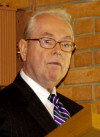 3/26/2006
- AHF of Washington, DC's annual 1848 commemoration. The Chapel at Wesley Theological Seminary at American University
in Washington, D.C., was the setting for this year's commemoration which
featured speeches on Louis Kossuth and the implications of 1848 on recent
Hungarian politics and ethnic relations in the Carpathian Basin. 3/26/2006
- AHF of Washington, DC's annual 1848 commemoration. The Chapel at Wesley Theological Seminary at American University
in Washington, D.C., was the setting for this year's commemoration which
featured speeches on Louis Kossuth and the implications of 1848 on recent
Hungarian politics and ethnic relations in the Carpathian Basin.
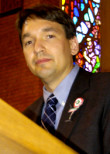 The
keynote speaker was Andras Ferenc Bodor who remarked, "Én
ahhoz a generációhoz tartozom, amelyik a márciusi
ifjak forradalmi attitudjét 1988-89-ben vitték a budapesti
utcákra a kommunista diktatúra hatalmi gépezetével
szemben. Ezzel a generációval szebben bánt a sors,
nekünk nem kellett az életünket áldoznunk a harcunk
sikeréért, és nem kellett a hazánkat elhagynunk
egy elbukott - mondhatnánk, hogy csak a hosszútávú
hatásában gyoztes - harc után." [download
his speech here]. The event was closed by a stirring speech Rev. Gábor
Nagy. [read more] The
keynote speaker was Andras Ferenc Bodor who remarked, "Én
ahhoz a generációhoz tartozom, amelyik a márciusi
ifjak forradalmi attitudjét 1988-89-ben vitték a budapesti
utcákra a kommunista diktatúra hatalmi gépezetével
szemben. Ezzel a generációval szebben bánt a sors,
nekünk nem kellett az életünket áldoznunk a harcunk
sikeréért, és nem kellett a hazánkat elhagynunk
egy elbukott - mondhatnánk, hogy csak a hosszútávú
hatásában gyoztes - harc után." [download
his speech here]. The event was closed by a stirring speech Rev. Gábor
Nagy. [read more]
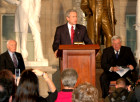 March
15th marks Hungary's National Day and the anniversary of its historic
1848 democratic revolution led by Louis
Kossuth against Hapsburg domination. “I believe the
example of Hungary proves that freedom is universal. I believe everybody
desires to live in freedom,” President Bush said. March
15th marks Hungary's National Day and the anniversary of its historic
1848 democratic revolution led by Louis
Kossuth against Hapsburg domination. “I believe the
example of Hungary proves that freedom is universal. I believe everybody
desires to live in freedom,” President Bush said.  “It's
an example that tyranny can never stamp out the desire to be free.”
Numerous AHF members joined the event chair, Congressman Tom Lantos and
distiguished speakers and guests that included Congressmen Pelosi, Hastert,
Reid, Frist, and Hyde, Defense Secretary Rumsfeld, Hungarian Ambassador
Simonyi, Washington, D.C. Mayor Anthony Williams, and US Ambassador to
Hungary Walker in the US Capitol. “It's
an example that tyranny can never stamp out the desire to be free.”
Numerous AHF members joined the event chair, Congressman Tom Lantos and
distiguished speakers and guests that included Congressmen Pelosi, Hastert,
Reid, Frist, and Hyde, Defense Secretary Rumsfeld, Hungarian Ambassador
Simonyi, Washington, D.C. Mayor Anthony Williams, and US Ambassador to
Hungary Walker in the US Capitol.
 3/14/2004 - AHF Celebrating Hungary's
National Day in Washington, D.C...The American Hungarian Federation
celebrated March 15th, Hungary's National Day commemorating the 1848 democratic
revolution headed by Louis Kossuth. AHF's 1st Vice President Frank Koszorus
and Louis Segesvary delivered poignant speeches on the life and impact
of Kossuth, only the second foreign leader to address a joint session
of Congress. Click to [download the full article] by
AHF's Dr. Louis Segesvary. 3/14/2004 - AHF Celebrating Hungary's
National Day in Washington, D.C...The American Hungarian Federation
celebrated March 15th, Hungary's National Day commemorating the 1848 democratic
revolution headed by Louis Kossuth. AHF's 1st Vice President Frank Koszorus
and Louis Segesvary delivered poignant speeches on the life and impact
of Kossuth, only the second foreign leader to address a joint session
of Congress. Click to [download the full article] by
AHF's Dr. Louis Segesvary.
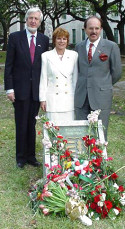 4/6/2002
- Louisiana Hungarians unveil Kossuth
Plaque in New Orleans. The plaque was placed in Lafayette Park
in front of Gallier Hall in the old New Orleans city center, near to where
Kossuth addressed a large audience in 1852. While thousands came to greet
him, the welcome was not unanimous due to Kossuth's democratic and anti-slavery
viewpoints. The bronze relief casting was done by AHF's 4/6/2002
- Louisiana Hungarians unveil Kossuth
Plaque in New Orleans. The plaque was placed in Lafayette Park
in front of Gallier Hall in the old New Orleans city center, near to where
Kossuth addressed a large audience in 1852. While thousands came to greet
him, the welcome was not unanimous due to Kossuth's democratic and anti-slavery
viewpoints. The bronze relief casting was done by AHF's 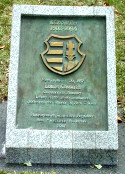 Gyuri Hollósy. Gyuri Hollósy.
The inscription reads, "Kossuth 1802-1894. Here
on March 30, 1852 Louis Kossuth Governor of Hungary Leader of the 1848
revolution addressed the Citizens of New Orleans. Hungarians of Louisiana,
Árpádhon And Hungarians Worldwide" The project initiators
were Dr. Istvan Gergátz and wife Julianna Bika. [read
more]
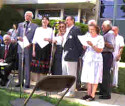 7/13//2001 - Laszlo and Agnes Fulop and the Minnesota Hungarians participate
in unveiling of Kossuth Statue in Kossuth County, Iowa. The County
was founded on January 15, 1851, honoring Hungary's increa 7/13//2001 - Laszlo and Agnes Fulop and the Minnesota Hungarians participate
in unveiling of Kossuth Statue in Kossuth County, Iowa. The County
was founded on January 15, 1851, honoring Hungary's increa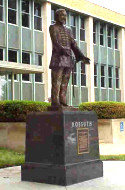 singly popular
hero, Kossuth. Iowa
governor Hampstead had invited Kossuth to visit the State in early 1852. singly popular
hero, Kossuth. Iowa
governor Hampstead had invited Kossuth to visit the State in early 1852.
Conveying his regrets, Kossuth instead suggested that associations be
formed to provide Hungary with "material aid" Several communities
within the County have named streets after Kossuth as well. The County's
population and leadership had not lost track of its history. Culmination
was the 150th anniversary of its founding in 2001 with its observances. [read
more]
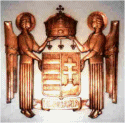 5/2/1961
- Mrs. Bela Bachkai of the American Hungarian Federation
of Washington DC presented the County with a stylized Hungarian coat of
arms,since displayed in the third floor hallway of the County
Courthouse in Algona. 5/2/1961
- Mrs. Bela Bachkai of the American Hungarian Federation
of Washington DC presented the County with a stylized Hungarian coat of
arms,since displayed in the third floor hallway of the County
Courthouse in Algona.
[<< Back to All AHF News]
|
Shortcuts:
Downloads:
Famous Quotes
 "the house of Habsburg-Lorraine, perjured in the sight of
God and man, had forfeited the Hungarian throne." "the house of Habsburg-Lorraine, perjured in the sight of
God and man, had forfeited the Hungarian throne."
Hungary, April 1849
"All for the people and all by the people. Nothing about
the people without the people. That is Democracy, and that is the ruling
tendency of the spirit of our age."
Spoken before the Ohio State Legislature,
February 16, 1852
About Louis
Kossuth
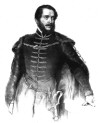 Kossuth
Lajos (b. 1802, d. 1894, pronounced co-shoot luh-yôsh) was Governor of Hungary during fight for independence and democracy which
was eventually defeated by the union of the royalist Austrian Habsburg
and Russian Czarist Armies (1848 - 1849). Kossuth envisioned a federation
in the Kingdom of Hungary in which all nationalties participated in a
vibrant democratic system based on fundamental democratic principles such
as equality and parliamentary representation. The bloody conflict eventually
led to a great compromise known as the "Austro-Hungarian Empire,"
in which Hungary gained some autonomy. although Kossuth would have no
part in it and demanded full indepependence until his death. Kossuth
Lajos (b. 1802, d. 1894, pronounced co-shoot luh-yôsh) was Governor of Hungary during fight for independence and democracy which
was eventually defeated by the union of the royalist Austrian Habsburg
and Russian Czarist Armies (1848 - 1849). Kossuth envisioned a federation
in the Kingdom of Hungary in which all nationalties participated in a
vibrant democratic system based on fundamental democratic principles such
as equality and parliamentary representation. The bloody conflict eventually
led to a great compromise known as the "Austro-Hungarian Empire,"
in which Hungary gained some autonomy. although Kossuth would have no
part in it and demanded full indepependence until his death.
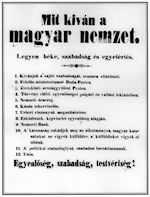 The speech from which the above excerpt is taken was given over a decade
before Lincoln's famed "for the people, by the people" speech
given at Gettysburg in 1863. Kossuth was the first foreign Statesman officially
invited to the US since the Marquis de Lafayette. His upcoming speech
in the Congress of the United States made the pre-civil war joint house
nervous due to his democratic views on equality of all men. Kossuth learned
English while in prison and exile and spoke to half the population of
the US who enthusiastically greeted and flocked to hear him. Despite Hungary's
epic struggle and Kossuth's brave and noble efforts, the US, the "Bastion
of Democracy" turned him away, empty handed. Hungary was alone again
in its fight for democracy in 1956, and didn't gain freedom until 1989 and would soon join NATO. The speech from which the above excerpt is taken was given over a decade
before Lincoln's famed "for the people, by the people" speech
given at Gettysburg in 1863. Kossuth was the first foreign Statesman officially
invited to the US since the Marquis de Lafayette. His upcoming speech
in the Congress of the United States made the pre-civil war joint house
nervous due to his democratic views on equality of all men. Kossuth learned
English while in prison and exile and spoke to half the population of
the US who enthusiastically greeted and flocked to hear him. Despite Hungary's
epic struggle and Kossuth's brave and noble efforts, the US, the "Bastion
of Democracy" turned him away, empty handed. Hungary was alone again
in its fight for democracy in 1956, and didn't gain freedom until 1989 and would soon join NATO.
Today, there are many reminders of Kossuth's impact on America and the
world. In North America, there is a Kossuth County in the state of Iowa,
a town with his name in Indiana, Ohio and Mississippi,
a settlement with a Kossuth Post Office is in Pennsylvania. In addition,
there are Kossuth statues and plaques in New York, Cleveland, Akron, New
Orleans, Washington, and Ontario, Canada. The Hungarian
Reformed Federation's building on Dupont Circle, in Washington, DC
is called Kossuth House with a memorial plaque commemorating his speech
on democracy. See the picture gallery and memorials on Louis
Kossuth in North America.
The renowned Ralph Waldo Emerson said in greeting Kossuth on his arrival
at Concord, MA, May 11, 1852:
"[we] have been hungry to see the man whose extraordinary eloquence
is seconded by the splendor and the solidity of his actions."
Kossuth was greeted with wild enthusiasm across the country. He was only
the second foreign leader (second to Lafayette) to address a joint session
of Congress. The American Hungarian Federation dedicated a bust that now sits proudly in the US Capitol - it reads, "Louis
Kossuth, Father of Hungarian Democracy" [read more]
Audio
Resources
 Hear
Louis Kossuth Speak! [Click Here] - This is the speech of Louis Kossuth which he gave for the dedication of the statue for the 13 Hungarian generals, who were executed at Arad, Hungary, on October 6, 1849 (Arad is in Rumania today after annexation due to the Treaty of Trianon in 1920 ).
Louis Kossuth was exiled after the fall of the Hungarian Liberation Fight of 1848 and made his permanent home in Torino (Turin), Italy. He could not attend the dedication of the monument at Arad, without risking arrest, so he recorded his speech inTurin, and sent it to Arad using the new technology of sound recording, called the phonograph. Hear
Louis Kossuth Speak! [Click Here] - This is the speech of Louis Kossuth which he gave for the dedication of the statue for the 13 Hungarian generals, who were executed at Arad, Hungary, on October 6, 1849 (Arad is in Rumania today after annexation due to the Treaty of Trianon in 1920 ).
Louis Kossuth was exiled after the fall of the Hungarian Liberation Fight of 1848 and made his permanent home in Torino (Turin), Italy. He could not attend the dedication of the monument at Arad, without risking arrest, so he recorded his speech inTurin, and sent it to Arad using the new technology of sound recording, called the phonograph.
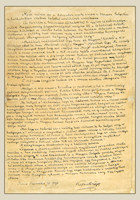 The recording was made on September 20, 1890, when Kossuth was 88 years old. It is a sad fact that the monument Kossuth sent his speech for was torn down by the Rumanian government when they annexed Transylvania, along with Arad, in 1920, after World War I. The recording was made on September 20, 1890, when Kossuth was 88 years old. It is a sad fact that the monument Kossuth sent his speech for was torn down by the Rumanian government when they annexed Transylvania, along with Arad, in 1920, after World War I.
The original
recording on two wax cylinders for the Edison phonograph survives to this
day, although barely audible due to excess playback and unsuccessful early
restoration attempts. Lajos Kossuth is the earliest born person
in the world who has his voice preserved. Since the audio
is of such poor quality, here is it is transcribed in Hungarian and translated
to English (special thanks to Louis
Kossuth in North America)
Hungarian |
English |
"A világ bírája
a történelem fog e kérdésre felelni. Legyenek
a szentemlékû vértanúk megáldottak
poraikban, szellemeikben a hon szabadság Istenének
legjobb áldásaival az örökkévalóságon
keresztül; engem ki nem borulhatok le a Magyar Golgota porába,
engem október 6-a térdeimre borulva fog hontalanságom
remete lakában látni a mint az engem kitagadott Haza
felé nyújtva agg karjaimat a hála hû
érzelmeivel áldom a vértanúk szent emlékét
hûségükért a Haza iránt, 's a magasztos
példáért, melyet az utódoknak adtanak;
's buzgó imával kérem a magyarok Istenét,
hogy tegye diadalmassá a velõkig ható szózatot,
mely Hungária ajkairól a Magyar Nemzethez zeng. Úgy
legyen Ámen!
Turin
September 20 1890
Kossuth Lajos |
"The judge of the universe,
history, will decide over this question. Should the saintly remembered
martyrs be hallowed in their ashes, in their spirit with the highest
blessings of the Lord of Liberty and through eternity; I can not
pay my sympathies to the ashes of the Hungarian Golgotha, but October
6 will find me on my knees in this reclusive home of exile, as I
open my arms to my disowning homeland. With gratitude's faithful
sentiments, I bless the martyrs' sacred memory for their faith in
their homeland and for the sublime example they left to their heirs:
with ardent prayer I beg the God of Hungarians to make their appeal
which echoes from the lips of Hungaria to the Hungarian Nation.
So be it, Amen!
Turin
September 20 1890
Lajos Kossuth |
|
Click to hear the recording: |
"Kossuth Lajos azt üzente,
elfogyott a regimentje.
Ha még egyszer azt üzeni,
mindnyájunknak el kell menni,
Éljen a magyar szabadság,
Éljen a haza ! |
Esik esõ karikára,
Kossuth Lajos kalapjára.
Valahány csepp esik rája,
Annyi áldás szálljon rája,
Éljen a magyar szabadság,
Éljen a haza!" |
Links
- AHF and the Kossuth Bust in the US Capitol
- AHF commemorating 1848
- President Bush Honors 1848 and Hungary's Contributions to Democracy
- HRFA's excellent Kossuth in America [visit]
- Select Speeches of Kossuth, Condensed and Abridged, with Kossuth's
Express Sanction [visit]
- Louis Kossuth, Mason And Apostle Of World Democracy [visit]
- Count Apponyi's Oration on the Death of Louis Kossuth [visit]
- Wikipedia - [visit]
and add your thoughts!
- Louis Kossuth in North America [visit]
- Kossuth County, Iowa [visit]
- Kossuth County, Iowa statue dedication
[visit]
- Dedication of statue to replace one destroyed by
Rumanian occupation
forces in 1921:
Gyergyócsomafalva, Transylvania [visit]
|



